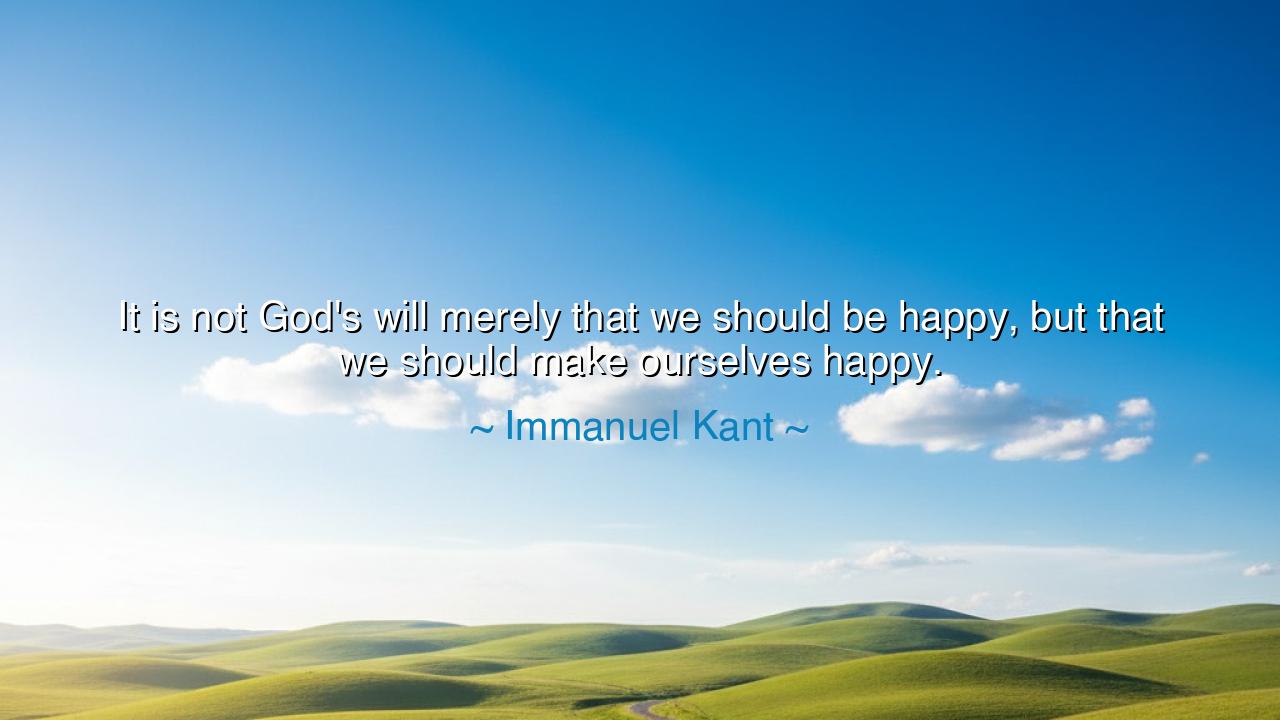
It is not God's will merely that we should be happy, but that we
It is not God's will merely that we should be happy, but that we should make ourselves happy.






Hear now the solemn wisdom of Immanuel Kant, the philosopher of duty and the seeker of moral truth, who said: “It is not God’s will merely that we should be happy, but that we should make ourselves happy.” In these few words, he draws a boundary between comfort and virtue, between the ease that is given and the fulfillment that is earned. For Kant, happiness is not a gift to be received idly from heaven, but a sacred labor — the work of the soul upon itself. To live well, he teaches, is not to wait for blessings, but to rise and create them through wisdom, strength, and moral will.
In the age of Kant, Europe was awakening from its long slumber beneath dogma. The Enlightenment had kindled a fire of reason, and men were learning that faith and thought need not be enemies. Kant, standing between heaven and earth, sought to reconcile divine purpose with human freedom. When he spoke of God’s will, he did not mean a will that rules by force, but one that calls humanity to responsibility — to become co-creators of their own destiny. To say that we must make ourselves happy is to say that the divine spark within each of us demands action, growth, and the conscious shaping of our moral lives.
For Kant, happiness was not mere pleasure. Pleasure passes like a summer storm; it refreshes but does not nourish. True happiness, he believed, springs from the harmony between duty and desire — from living in accordance with the moral law within. When a person acts not out of fear or selfishness, but from respect for what is right, his soul becomes free. And in that freedom lies happiness. Thus, God’s will is not that we be merely content, but that we attain the dignity of self-created joy — the joy that arises from a life well-lived, guided by reason, conscience, and courage.
Consider the life of Florence Nightingale, the lady of the lamp, who in the grim hospitals of war found no comfort, no luxury, no rest. She did not wait for happiness to come to her; she made it through service. Amid filth and suffering, she turned despair into hope, disarray into healing. Her joy was not in ease but in purpose. In every bandage she tied, in every life she saved, she wove together the meaning of Kant’s truth — that happiness is not given by divine decree, but created by the steadfast heart that acts in harmony with divine will.
Kant’s wisdom stands as a challenge to every soul that cries out to the heavens for deliverance while refusing to labor for its own peace. He reminds us that God has already placed within us the tools for joy: the ability to reason, to choose, to love, to act rightly even when no one watches. The lazy spirit prays for miracles; the noble spirit becomes one. In this way, making ourselves happy is not rebellion against God — it is obedience to the highest part of His will. It is to take the divine gift of freedom and use it to build a life of meaning, not idleness.
And yet, this path requires courage. For it is easier to blame fate or circumstance than to shape one’s own destiny. Many prefer to drift, waiting for happiness as a beggar waits for alms. But the wise understand that happiness, like virtue, demands cultivation. The farmer tills his soil, the artist perfects his craft, the seeker disciplines his mind — all must labor for what is good. In this way, every small act of discipline, every moment of gratitude, every choice to act with integrity becomes a stone in the temple of self-made happiness.
So, my child, take this truth into your heart: do not wait for the world to make you happy, for the world owes you nothing. Instead, awaken the will that God has placed within you. Labor for your joy. Let your happiness be the fruit of honesty, compassion, and perseverance. When you fall, rise again; when you are weary, remember that each step forward is sacred. For in the end, those who build their own happiness honor both themselves and the divine.
Thus, the teaching of Immanuel Kant stands like a beacon through the ages: God’s will is not that we sit idle beneath His grace, but that we rise and become the artisans of our own contentment. Happiness is not found by asking for it — it is found by living rightly, by fulfilling the potential He has placed within us. To make oneself happy, then, is the holiest of labors — the act by which man becomes a partner in creation, and the spirit of God finds reflection in the human heart.






AAdministratorAdministrator
Welcome, honored guests. Please leave a comment, we will respond soon